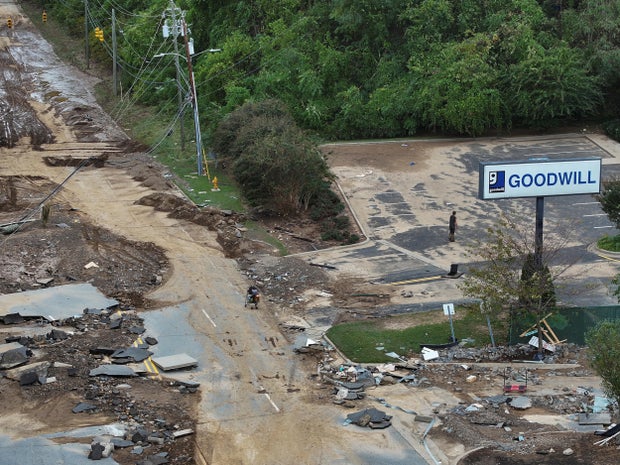CBS News
Asheville, North Carolina, devastated by Helene as state faces “unprecedented tragedy”

A crisis unfolded in Asheville, North Carolina, as officials pledged to get more water, food and other supplies to flood-stricken areas without power and cellular service Monday, days after Hurricane Helene ripped across the U.S. Southeast. More than 115 deaths were attributed to the storm across six states as of Monday morning, CBS News confirmed.
A North Carolina county that includes the mountain city of Asheville reported at least 35 people killed, officials said Monday.
Gov. Roy Cooper predicted the toll would rise as rescuers and other emergency workers reached areas isolated by collapsed roads, failing infrastructure and widespread flooding.
“This is an unprecedented tragedy that requires an unprecedented response,” Cooper said at a press conference Sunday. He added that “we know there will be more” deaths as rescuers reach isolated areas.
Supplies were being airlifted to the region around the isolated city of Asheville. Buncombe County Manager Avril Pinder pledged that she would have food and water in the city by Monday.
/ Getty Images
“We hear you. We need food and we need water,” Pinder said on a Sunday call with reporters. “My staff has been making every request possible to the state for support and we’ve been working with every single organization that has reached out. What I promise you is that we are very close.”
Officials warned that rebuilding from the widespread loss of homes and property would be lengthy and difficult. The storm upended life throughout the Southeast. Deaths were also reported in Florida, Georgia, South Carolina and Virginia.
Cooper implored residents in western North Carolina to avoid travel, both for their own safety and to keep roads clear for emergency vehicles. More than 50 search teams spread throughout the region in search of stranded people.
One rescue effort involved saving 41 people north of Asheville. Another mission focused on saving a single infant. The teams found people through both 911 calls and social media messages, North Carolina National Guard Adjutant General Todd Hunt said.
President Biden described the impact of the storm as “stunning” and said he would visit the area this week as long as it does not disrupt rescues or recovery work. In a brief exchange with reporters, he said the administration is giving states “everything we have” to help with their response to the storm.
Marco Bello / REUTERS
Hurricane Helene roared ashore late Thursday in Florida’s Big Bend region as a Category 4 hurricane with 140 mph winds. A weakened Helene quickly moved through Georgia, then soaked the Carolinas and Tennessee with torrential rains that flooded creeks and rivers and strained dams.
There have been hundreds of water rescues, including in rural Unicoi County in East Tennessee, where dozens of patients and staff were plucked by helicopter from a hospital rooftop Friday.
More than 2 million homeowners and other utility customers were still without power Sunday night. South Carolina had the most outages and Gov. Henry McMaster asked for patience as crews dealt with widespread snapped power poles.
“We want people to remain calm. Help is on the way, it is just going to take time,” McMaster told reporters outside the airport in Aiken County.
The storm unleashed the worst flooding in a century in North Carolina. One community, Spruce Pine, was doused with over 2 feet of rain from Tuesday through Saturday.
/ Getty Images
The state was sending water supplies and other items toward Buncombe County and Asheville, but mudslides blocking Interstate 40 and other highways prevented supplies from making it. The county’s own water supplies were on the other side of the Swannanoa River, away from where most of the 270,000 people in Buncombe County live, officials said.
Law enforcement was making plans to send officers to places that still had water, food or gas because of reports of arguments and threats of violence, the county sheriff said.
FEMA Administrator Deanne Criswell toured south Georgia on Sunday and planned to be in North Carolina on Monday.
“It’s still very much an active search and rescue mission” in western North Carolina, Criswell said. “And we know that there’s many communities that are cut off just because of the geography” of the mountains, where damage to roads and bridges have cut off certain areas.
Criswell said on “Face the Nation with Margaret Brennan” that the historic flooding in North Carolina has gone beyond what anyone could have planned for in the area.
“I don’t know that anybody could be fully prepared for the amount of flooding and landslides that they are experiencing right now,” she said.
Biden on Saturday pledged federal government help for Helene’s “overwhelming” devastation. He also approved a disaster declaration for North Carolina, making federal funding available for affected individuals.
CBS News
Biden’s top hostage envoy Roger Carstens in Syria to ask for help in finding Austin Tice

Roger Carstens, the Biden administration’s top official for freeing Americans held overseas, on Friday arrived in Damascus, Syria, for a high-risk mission: making the first known face-to-face contact with the caretaker government and asking for help finding missing American journalist Austin Tice.
Tice was kidnapped in Syria 12 years ago during the civil war and brutal reign of now-deposed Syrian dictator Bashar al-Assad. For years, U.S. officials have said they do not know with certainty whether Tice is still alive, where he is being held or by whom.
The State Department’s top diplomat for the Middle East, Barbara Leaf, assistant secretary of state for Near Eastern Affairs, accompanied Carstens to Damascus as a gesture of broader outreach to Hay’at Tahrir al-Sham, known as HTS, the rebel group that recently overthrew Assad’s regime and is emerging as a leading power.
Near East Senior Adviser Daniel Rubinstein was also with the delegation. They are the first American diplomats to visit Damascus in over a decade, according to a State Department spokesperson.
They plan to meet with HTS representatives to discuss transition principles endorsed by the U.S. and regional partners in Aqaba, Jordan, the spokesperson said. Secretary of State Antony Blinken traveled to Aqaba last week to meet with Middle East leaders and discuss the situation in Syria.
While finding and freeing Tice and other American citizens who disappeared under the Assad regime is the ultimate goal, U.S. officials are downplaying expectations of a breakthrough on this trip. Multiple sources told CBS News that Carstens and Leaf’s intent is to convey U.S. interests to senior HTS leaders, and learn anything they can about Tice.
Rubinstein will lead the U.S. diplomacy in Syria, engaging directly with the Syrian people and key parties in Syria, the State Department spokesperson added.
Diplomatic outreach to HTS comes in a volatile, war-torn region at an uncertain moment. Two sources even compared the potential danger to the expeditionary diplomacy practiced by the late U.S. Ambassador Christopher Stevens, who led outreach to rebels in Benghazi, Libya, in 2012 and was killed in a terrorist attack on a U.S. diplomatic compound and intelligence post.
U.S. special operations forces known as JSOC provided security for the delegation as they traveled by vehicle across the Jordanian border and on the road to Damascus. The convoy was given assurances by HTS that it would be granted safe passage while in Syria, but there remains a threat of attacks by other terrorist groups, including ISIS.
CBS News withheld publication of this story for security concerns at the State Department’s request.
Sending high-level American diplomats to Damascus represents a significant step in reopening U.S.-Syria relations following the fall of the Assad regime less than two weeks ago. Operations at the U.S. embassy in Damascus have been suspended since 2012, shortly after the Assad regime brutally repressed an uprising that became a 14-year civil war and spawned 13 million Syrians to flee the country in one of the largest humanitarian disasters in the world.
The U.S. formally designated HTS, which had ties to al Qaeda, as a foreign terrorist organization in 2018. Its leader, Mohammed al Jolani, was designated as a terrorist by the US in 2013 and prior to that served time in a US prison in Iraq.
Since toppling Assad, HTS has publicly signaled interest in a new more moderate trajectory. Al Jolani even shed his nom de guerre and now uses his legal name, Ahmed al-Sharaa.
U.S. sanctions on HTS linked to those terrorist designations complicate outreach somewhat, but they haven’t prevented American officials from making direct contact with HTS at the direction of President Biden. Blinken recently confirmed that U.S. officials were in touch with HTS representatives prior to Carstens and Leaf’s visit.
“We’ve heard positive statements coming from Mr. Jolani, the leader of HTS,” Blinken told Bloomberg News on Thursday. “But what everyone is focused on is what’s actually happening on the ground, what are they doing? Are they working to build a transition in Syria that brings everyone in?”
In that same interview, Blinken also seemed to dangle the possibility that the U.S. could help lift sanctions on HTS and its leader imposed by the United Nations, if HTS builds what he called an inclusive nonsectarian government and eventually holds elections. The Biden administration is not expected to lift the U.S. terrorist designation before the end of the president’s term on January 20th.
Pentagon spokesperson Pat Ryder disclosed Thursday that the U.S. currently has approximately 2,000 US troops inside of Syria as part of the mission to defeat ISIS, a far higher number than the 900 troops the Biden administration had previously acknowledged. There are at least five U.S. military bases in the north and south of the country.
The Biden administration is concerned that thousands of ISIS prisoners held at a camp known as al-Hol could be freed. It is currently guarded by the Syrian Democratic forces, Kurdish allies of the U.S. who are wary of the newly-powerful HTS. The situation on the ground is rapidly changing since Russia and Iran withdrew military support from the Assad regime, which has reset the balance of power. Turkey, which has been a sometimes problematic U.S. ally, has been a conduit to HTS and is emerging as a power broker.
A high-risk mission like this is unusual for the typically risk averse Biden administration, which has exercised consistently restrained diplomacy. Blinken approved Carstens and Leaf’s trip and relevant congressional leaders were briefed on it days ago.
“I think it’s important to have direct communication, it’s important to speak as clearly as possible, to listen, to make sure that we understand as best we can where they’re going and where they want to go,” Blinken said Thursday.
At a news conference in Moscow Thursday, Russian President Vladimir Putin said he had not yet met with Assad, who fled to Russia when his regime fell earlier this month. Putin added that he would ask Assad about Austin Tice when they do meet.
Tice, a Marine Corps veteran, worked for multiple news organizations including CBS News.
CBS News
12/19: CBS Evening News – CBS News

Watch CBS News
Be the first to know
Get browser notifications for breaking news, live events, and exclusive reporting.
CBS News
Delivering Tomorrow: talabat’s Evolution in the Middle East

Watch CBS News
Be the first to know
Get browser notifications for breaking news, live events, and exclusive reporting.











